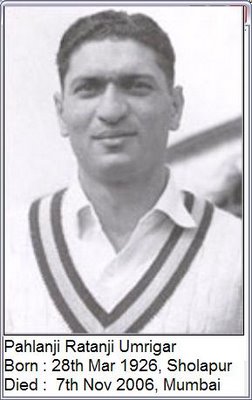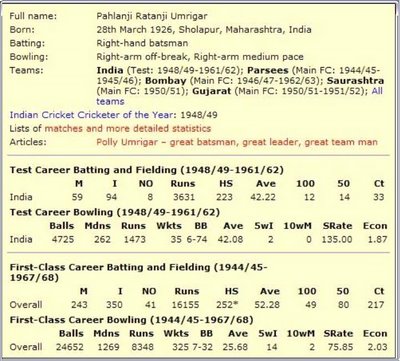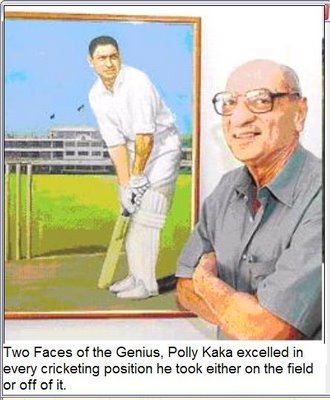 Long before Tendulkar started breaking cricket records, it was Gavaskar and before that it was Umrigar. Undoubtedly the earliest cricketer to have played under the tag of record breaker, much before the Gavaskars, Tendulkars, Kapil Devs and Kumbles was Pahlan Ratanji Umrigar, known more popularily as Polly Umrigar.
Long before Tendulkar started breaking cricket records, it was Gavaskar and before that it was Umrigar. Undoubtedly the earliest cricketer to have played under the tag of record breaker, much before the Gavaskars, Tendulkars, Kapil Devs and Kumbles was Pahlan Ratanji Umrigar, known more popularily as Polly Umrigar.Addressed affectionately as Polly Kaka by the later generation of cricketers, especially those who played for Bombay, Polly Umrigar was one of the greatest all-round cricketers and shrewdest cricketing brains that India or for that matter the World has ever produced.
More importantly he was also considered as one of the finest human beings ever to have graced the game of cricket by his team mates as well as his successors in both Bombay and National Cricket Scene.
After a long battle with the lymph cancer, India’s all-time great and the original record-setting batsman succumbed to the disease at 8.32am on Tuesday, 7th November, 2006. He was hospitalized in June but died at his residence Sportfield, the home of India’s celebrated sporting families.
With the death of this great cricketing hero India has lost one of their greatest and longest serving brains of the game. In addition to several milestones he surpassed during his illustrious cricketing career, he recently, touched a personal milestone of celebrating his eightieth birthday and joining the octogenarian club on March 28th, 2006.
It is unfortunate that he did not go on to captain the national side for more than just 8 outings (2W-2L-4D), But the age long attitude and arrogance of the Cricket Board, because of which Umrigar relinquished the captaincy during the ill-fated 1959-60 home series against West Indies during which India had four captains in a 5-test series.
Umrigar who captained the side in the first test at Bombay in the absence of Gulam Ahmed was supposed to have captained the side at Madras too for the 4th test after Gulam Ahmed not only resigned the captaincy but also announced his retirement as he was not able to curb the fast declining fate of Indian Cricket team’s fortunes amidst the fast and furious pace of Wes Hall and Roy Gilchrist.
The Cricket Board then got into action the only way they could, i.e. with their ever inexplicable way of making the selections and suggestions, offered to substitute the injured and unavailable players (it was debated at that time whether it was the injuries which rendered them unavailable for the selection or was it really their unwillingness to face the pace of Wes Hall & Gilchrist ) with out even bothering to look at the matching skill sets of the replacements and not taking the captains input, to the extent that Umrigar was told by the Board Secretary that as per the BCCI President Ratibhai Patel’s wish Jasu Patel will be replacing Vijay Manjrekar. This made Polly furious and tend his resignation on the eve of the test match.
Though the Board pleaded him to reconsider his decision, Polly stuck to his words and suggested Vinoo Mankad’s name instead. True to their nature of keeping the grudge, the Cricket Board saw to it that Umrigar never captained India after that though he played significant number of test matches till he retired in 1961/62 at the end of West Indies tour. Not surprisingly 38 years later, Umrigar also quit the post of executive secretary of the cricket board in 1997 when he realized that the board runs in an altogether autonomous and dictatorial way, none of his ideas were welcome and his experience and knowledge were never utilized.

He followed the game passionately both at domestic and at International level. There can be no better student of the game than Umrigar. In an interview back in 2004, when no one heard of the name of MS Dhoni, he suggested that he is an exciting prospect for wicket keeping position, when asked about the wicket keeping choices in ODIs as Dravid was keeping wickets then and both Parthiv Patel and Dinesh Karthik were not performing well.
In the same interview he also expressed his anguish about players keeping their positions in the team on the basis of their past glory: “Some of the cricketers have started taking their place in the side for granted. I have also played Test cricket and know the affection people shower on you, but I don't agree to the demi-god status awarded to cricketers here. The problem is when players start taking this seriously. We are only sportsmen, and there are players like Tendulkar, who are indispensable but not bigger than the game.
Someone like Virender Sehwag can get away playing all the poor shots because he's taking that status for granted. Also he knows there aren't people to push him out of that. Sehwag has received a lot of flak for his performances recently. “- Two years later those words are still as true as they can get.
Always eager to help cricketers in whatever way he could, he always provided great batting tips and suggestions on the game to younger cricketers. As Chandu Borde recalled in his tribute : Umrigar was always very generous and gave youngsters lessons on how to prepare for a game and mentally be ready to face the opposite team's fast bowling attack. His influence on superstars of his next generation was so much that the Cricket’s living legend Gavaskar himself said that he learnt a lot of lessons in the game from him. "I have learnt so much from him that I can't pinpoint one particular thing. He once told me that I try and take my first run too early. He told me to take at least the first few runs safely", Gavaskar also said that though Umrigar had achieved so much in cricket he never once spoke about his feats and trumpeted his achievements. "The only time he spoke about his cricket was when discussing strategies on how to get people out. Even that was a great learning experience.”
 Tributes also poured in from all corners of India and the World both from cricketing and non-cricketing fraternities including that of Chandu Borde, Ajit Wadekar, Bishen Sigh Bedi, GR Viswanath , Dilip Vengsarakar, Ravi Shastri and Sachin Tendulkar who were all supposed to have shared the dais with Polly Umrigar in the recently held BCCI function felicitating – former & Present captains of Indian Cricket team. They all remembered how good a soul he was and how valuable advice his was in resolving some of their batting issues. Umrigar could not attend the function as he was undergoing treatment for lymph cancer which finally took his life.
Tributes also poured in from all corners of India and the World both from cricketing and non-cricketing fraternities including that of Chandu Borde, Ajit Wadekar, Bishen Sigh Bedi, GR Viswanath , Dilip Vengsarakar, Ravi Shastri and Sachin Tendulkar who were all supposed to have shared the dais with Polly Umrigar in the recently held BCCI function felicitating – former & Present captains of Indian Cricket team. They all remembered how good a soul he was and how valuable advice his was in resolving some of their batting issues. Umrigar could not attend the function as he was undergoing treatment for lymph cancer which finally took his life.As Dicky Rutnagur, one of the finest Cricket Commentators put in one sentence "even when he did not get runs Umrigar’s presence in the side was always a source of confidence and inspiration to the younger players.’’ - Umrigar was just not a cricketer but an institution.
Umrigar was born on March 28th, 1926 in Sholapur, Maharashtra where he spent his earlier childhood. During his teens his father was transferred to Bombay and that brought Umirgar to Bombay and he made that city as his home for the rest of his life. He made his first class debut for Parsees Vs Hindus in the 1944/45 semifinal of the Bombay Pentangular tournament when he was just 18yrs and made his Ranji Trophy debut couple of seasons later for Bombay against Sind at Karachi in 1946/47. A season in later he made his test debut in the 1947/48 series against visiting West Indians under Lala Amarnath’s captaincy in the 2nd test at Bombay.
For more than 14 years he provided the backbone for the brittle Indian middle order and often checked the frequent batting collapses against the fast bowling of the likes of Wes Hall, Roy Gilchrist, Freddie Trueman, Alec Bedser, Ray Lindwall, Alan Davidson and Co.
Following table lists the test and first class career records of Polly Umrigar:

In a first-class career that spanned from 1944-45 to 1962-63, Umrigar played 243 matches for an aggregate 16,155 runs at 52.28 with highest score being an unbeaten 252 against Cambridge University in 1959. That score stood as highest by an Indian player outside India for more than 30 years till Navjot Singh Sidhu made 286 against Jamaica during India’s tour of West Indies in 1988/89. He also led Bombay to five consecutive Ranji Trophy Championships from 1958/59 to 1962/63 seasons.
But it was in test cricket that he established many a record which stood for many years till his protégé Sunil Gavaskar surpassed.
He was the 1st Indian player to have played in 50 tests for India. First to have aggregated 3000 runs in a test career. First to have registered more than 10 test centuries. First to have scored a double hundred, 223 against New Zealand at Hyderabad in the 1st test of the 1954/55 series. But his most memorable innings was his first test century, a superb 130* at Madras against the visiting MCC side in the 5th test of the 1951/52 series that helped India achieve their first test match victory by an innings and 8 runs.
Umrigar’s 2nd hundred 102 against Pakistan at Bombay in 1952/53 too help India win a test match against Pakistan and made them lead the series 2-1 which ultimately proved out to be the margin for their first ever test series win.
Umrigar was also the first Indian to have registered a test match win making his debut as captain. He led India to an innings and 27 run victory against the Kiwis in the 2nd test at Bombay in 1955/56 in his maiden test as captain. At Madras in the 5th and final test of the same series Umrigar waited in the pavilion having his pads on for more than a day and half as Pankaj Roy and Vinoo Mankad established a World record partnership of 413 runs for the first wicket, which is yet to be surpassed.
Umrigar made an unbeaten 79 in that match which India won by an innings 109 runs thus wrapping up their first test series against a country other than Pakistan. So Umrigar is the first captain to have lead India for a test series triumph against a non-sub-continent team. In all Umrigar captained India in 8 tests, winning two losing two and drawing the remaining before the 1958/59 Madras test fiasco killed his zeal to lead the country. He was a great leader but at the same time did not have any inhibitions of playing under much junior players. He played under ten different captains but never ever shown his disappointment even once. He offered the same kind of help and played with same kind of enthusiasm and motivation right from his first test under Lala Amarnath to his final test under Mansur Ali Khan Pataudi. Very sadly he remained as “India’s finest captain never seen”
He was a great leader but at the same time did not have any inhibitions of playing under much junior players. He played under ten different captains but never ever shown his disappointment even once. He offered the same kind of help and played with same kind of enthusiasm and motivation right from his first test under Lala Amarnath to his final test under Mansur Ali Khan Pataudi. Very sadly he remained as “India’s finest captain never seen”
India’s first test win against Australia, in the 2nd test at Kanpur in 1959/60 came with a significant contribution from Polly Umrigar. Though he did not contribute much with the bat, Umrigar took 4/27 of 25 overs with 11 maidens and he with Jasu Patel wrecked Australia in their 2nd innings for 105. In the 1st innings of the test Jasu Patel returned with figures of 9/69. At the same venue, during the previous season in 1958/59 against West Indies in the 2nd test of the series when Subash Gupte took 9/102 and Umrigar made 57 & 34, India could not register a win and Umrigar ended his career without seeing a test victory against the mighty carribeans.
Umrigar became only the second indian after Vijay Hazare, to have hit a century in three consecutive tests and in consecutive innings during the 1960/61 and 1961/62 seasons when he scored 117 against Pakistan in 4th test at Madras, 112 in 5th test at Delhi and 147* against England in the 2nd test at Kanpur in 1961/62. India registered their first test series victory against England that season by winning the 4th test at Calcutta by 187 runs and 5th test at Madras by 128 runs.
Umrigar not only enojoyed all the good times but also shared the miseries of the Indian Cricket team that toured England in 1952. Though the tour was a successful one for Umrigar as he aggregated 1,688 runs, in tests he could muster just 43 runs. He was also part of the side when they lost their first four wickets with no runs on the board against England in the 1st test at Leeds. Polly was at non-striker’s end when the 4th wicket fell in the form of Vijay Manjrekar, who was clean bowled by Trueman. . However he and Dattu Phadkar made sure that they reached 26 (which incidentally is the lowest score in test cricket registered by New Zealand against England at Auckland in 1954/55), before the next wicket fell.
In 1959 series against England which India lost by 5-0 margin, he hit a hundred in the 4th test at Old Trafford and also witnessed the first Indian to have scored a test century on debut outside India. Abbas Ali Baig made 112 runs in that test whereas Umrigar made 118.
In 1952/53 series against West Indies Polly Umrigar aggregated 560 runs in the series with the help two hundreds 130 at Port of Spain in the 1st test and 117 at Kingston in the 5th test which equaled the then most number of runs in a test series by Indian, held by Rusi Modi.
Though he was a very good bowler and took 300+ wickets in first class cricket, he did not quite utilize that skill fully in test cricket. His first test wicket came in his 21st test, when he opened the bowling for India against Pakistan in 1954/55 at Bahawalpur . He celebrated the occasion by making it a 5-for with figures of 58-25-74-6.
Umrigar’s finest hour came during his final test series, in which he made 445 runs @ 49.44 and took 9 wickets @ 27.66 and held 4 catches. In the penultimate test of his career he made 56 & 172* and returned with figures of 56-24-107-5 & 16-8-17-0 at Port of Spain in the 4th test of the 1961-62 series. Umrigar still remains as one of the only two Indian cricketers to have achieved the feat of scoring a century and taking 5 wickets in an innings in the same test. Vinoo Mankad being the other all-rounder.
All through his career Polly Umrigar gathered his runs at brisk pace, he did not slow down even in the penultimate test of his career before he announced his retirement from test cricket, as his 172* came out of a total of 230 runs that were scored while he was at the crease and at a frenetic rate of those days, in just 248 minutes. He in fact earned a nick name of Palm Tree Hitter for his habit of hitting big sixes and holds the record for being the first Indian batsman to reach a century with a six, a feat that was later emulated by Kapil Dev, Sachin Tendulkar, Mohammad Azharuddin, Rahul Dravid and Virender Sehwag.
He kept his passion for the game with the same intensity and vigor for more than 67 years. He had first seen cricket as a 13 year old teenager. When he went to see a game that some seniors were playing, he ended up playing for them when the captain of the side asked him to join the team as they were a player short. He fielded in the deep fine leg and chased the balls most of the time not letting them reach the boundary as the wicket keeper kept missing them. After the match, the captain said "Polly you have a good cricket future. You are a very promising boy."
Polly Umrigar never forgot those words and kept the faith that captain had in him during his subsequent lifelong journey through the corridors of the game. Some People’s loss can never be overcome. Polly Kaka is one of them.
No comments:
Post a Comment